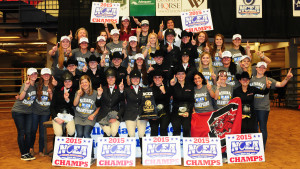paykwik al
online sportwetten
paykasa

paykwik
online sportwetten
paykasa
What Does the Future Hold For Collegiate Equestrian Competition? NEW UPDATE!

NCEA Equestrian Champions South Carolina Equestrian on Saturday, April 18, 2015 in Waco, Tex. Photo Credit: Anthony Hall/Auburn Athletics
WACO, Texas (June 16, 2015) – Along with more than 20,000 advocates for women’s collegiate equestrian programs across the U.S., the National Collegiate Equestrian Association (NCEA) celebrates the decision made by the National Collegiate Athletic Association (NCAA) committee’s to continue to support the growth and future of women’s collegiate equestrian.
Last month, the NCAA’s new Strategic Vision and Planning Committee (SVPC) reviewed the recommendation from the NCAA’s Committee on Women’s Athletics (CWA) to remove equestrian from the list of emerging sports for women in Divisions I. The SVPC voted to table this recommendation at its recent June 22 meeting, helping to ensure that equestrian remains a viable sport within the NCAA structure and will continue to function and flourish as a collegiate level sport.
“The equestrian community came together to voice its strong support for women’s collegiate equestrian programs across the nation,” said Dr. Leah Fiorentino, executive director of the NCEA. “We look forward to working with the NCAA to increase the number of NCAA equestrian teams.”
NCAA equestrian was established in 2002 as an emerging sport with only six schools participating. Since the CWA’s recommendation in fall 2014, the NCEA has structurally reorganized, installed an executive director and collaborated with the NCEA National Advisory Board (NAB). Today, 12 years later, the NCAA recognizes 22 colleges and universities with equestrian programs. Equestrian will continue as an emerging sport until the number of teams passes the current 40 team criteria needed to achieve championship sport status.
“Our NCEA participant schools have tremendous energy and are committed to a positive expansion of equestrian programs,” said David May, co-chair of the NAB. “We look forward to working with the NCAA to expand the sport to other campuses and continue to create a self-sustaining model for NCEA member schools.”
Working in conjunction with the NCEA, the NAB is committed to elevating and advancing equestrian to the most sustainable and strongest of all NCAA women’s sports. Now that the NCAA decision has been reached, the NAB will focus on making equestrian the first non-revenue generating sport to be financially independent. Although only in place for four months, the NAB has already launched several positive initiatives and has organized plans for fund-raising and friend-raising efforts that will begin immediately.
For more information about the NCEA, please visit http://www.collegiateequestrian.com.
About the National Collegiate Equestrian Association (NCEA)
The National Collegiate Equestrian Association (NCEA), a non-profit corporation, was created as a governing body to advance the sport of Equestrian for women at the collegiate level. In 1998, Equestrian was identified and adopted by the National Collegiate Athletic Association (NCAA) and the Committee of Women’s Athletics (CWA) as an emerging sport for women at the Division I and II levels. The NCEA, in concert with the mission and vision of the NCAA, is committed to providing collegiate opportunities for female equestrian student-athletes to compete at the highest level, while embracing equity, diversity and promoting academic and competitive excellence.










